Recent Water Damage Posts
What to Do When Your Basement Floods: Steps to Take
2/15/2024 (Permalink)
A flooded basement can be a homeowner's worst nightmare. Not only is it damaging to your property, but it can also pose safety hazards. Knowing what to do when your basement floods can minimize damage and ensure everyone's safety. In this blog post, we will discuss steps to take when faced with a flooded basement.
Ensure Personal Safety
Before entering the flooded basement, ensure your safety and avoid hazards. Turn off all electricity connected to the basement, including circuit breaker switches. If you are unable to access the circuit breaker, contact your power company to have it shut off. Additionally, wear protective gear such as rubber boots, gloves, and goggles to prevent contact with contaminated water.
Determine the Source of the Water
Identifying the source of the water is crucial in addressing the issue and preventing future flooding. Water intrusion could be from heavy rainfall, plumbing leaks, or sewer backups. If the issue is from a plumbing leak, turn off the water supply leading to the affected area.
Begin Water Removal
The sooner you begin water removal, the less damage your property will incur. Use a sump pump, wet-dry vacuum, or buckets to remove the standing water. Be sure to dispose of the water properly and legally, following your local and state regulations.
Dry Out the Affected Area
After removing the standing water, dry out the affected area with dehumidifiers, fans, or open windows to promote air circulation. Carpets, padding, and other absorbent materials may need to be removed and replaced if they cannot be completely dried.
Clean and Disinfect
Clean and disinfect the affected area thoroughly to prevent mold growth and ensure a hygienic living environment. Use cleaners that can effectively remove mold, bacteria, and other contaminants.
Contact Professionals
Contacting a professional water damage restoration company can help ensure the thorough cleanup and restoration of your basement. Professionals have the necessary equipment and expertise to handle complex water damage issues. They can also identify potential hazards and offer solutions to prevent future flooding.
A flooded basement can be a daunting issue to face, but taking prompt action can minimize the damage and ensure everyone's safety. By following these steps, you can tackle a flooded basement effectively, restoring your property and peace of mind.
Choosing Sustainable Materials to Rebuil After Water Damage
10/14/2023 (Permalink)
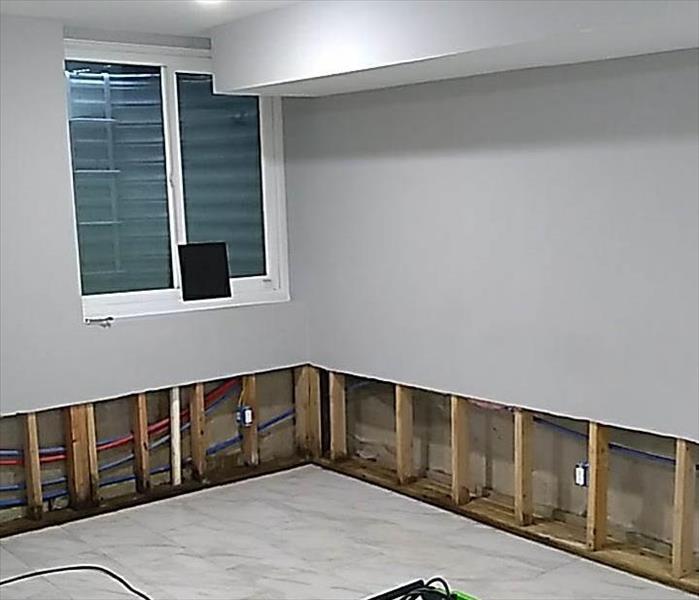 Rebuilding after water damage is a challenging process, but it also presents an opportunity to make eco-conscious choices.
Rebuilding after water damage is a challenging process, but it also presents an opportunity to make eco-conscious choices.
Water damage can be a devastating experience for homeowners and businesses alike in Pennsylvania. From burst pipes to severe storms, the aftermath of water damage can leave you with the daunting task of rebuilding. While the primary goal is to restore your property to its former glory, it's also essential to consider the environmental impact of your choices. In this blog, we'll explore the importance of choosing sustainable materials when rebuilding after water damage in Pennsylvania, and how it can benefit both you and the environment.
Why Choose Sustainable Materials?
Environmental Responsibility
Pennsylvania is known for its stunning natural beauty, and choosing sustainable materials for your rebuilding project is a way to give back to the environment. By opting for eco-friendly materials, you reduce the strain on natural resources, minimize waste, and lower your carbon footprint.
Energy Efficiency
Pennsylvania experiences a range of weather conditions throughout the year, from frigid winters to humid summers. Sustainable materials, such as energy-efficient windows and insulation, can help you maintain a comfortable indoor environment while reducing your energy bills.
Durability
Sustainable materials are often more durable and long-lasting than traditional options. This means less frequent replacements and repairs, which can save you money in the long run.
Choosing Sustainable Materials in Pennsylvania
Reclaimed Wood
Consider using reclaimed wood for flooring, furniture, or decorative elements. This type of wood is salvaged from old structures and repurposed, giving it a unique and rustic charm. Reclaimed wood not only adds character to your space but also reduces the demand for freshly cut timber.
Low VOC Paints
Volatile Organic Compounds (VOCs) found in traditional paints can release harmful toxins into the air. Opt for low-VOC or zero-VOC paints to ensure better indoor air quality for your Pennsylvania home or business.
Recycled Glass Countertops
Upgrade your kitchen or bathroom with recycled glass countertops. These stunning surfaces are made from recycled glass materials, making them an eco-friendly and stylish choice.
Insulated Concrete Forms (ICFs)
Pennsylvania's temperature fluctuations make proper insulation crucial. ICFs are an energy-efficient option that provides excellent insulation while reducing your heating and cooling costs.
Metal Roofing
Metal roofs are durable and recyclable, making them an excellent choice for Pennsylvania's climate. They can withstand harsh weather conditions and have a long lifespan.
Sustainable Flooring
Consider eco-friendly flooring options like bamboo, cork, or linoleum. These materials are renewable and biodegradable, making them sustainable choices for your home or business.
Rebuilding after water damage in Pennsylvania is a challenging process, but it also presents an opportunity to make eco-conscious choices that benefit both you and the environment. By selecting sustainable materials, you can reduce your environmental impact, save on energy costs, and create a durable and beautiful space. SERVPRO of South Philadelphia/SE Delaware County is committed to helping you through this process, and we can provide guidance and services to ensure your rebuilding project is as sustainable as possible. Contact us today to learn more about our restoration and rebuilding services in Pennsylvania.
Understanding Category 3 Water Damage: Causes, Risks, and Restoration
7/27/2023 (Permalink)
Water damage can be classified into different categories based on the level of contamination and potential health risks. Category 3 water damage, also known as black water, is the most severe and hazardous type. It involves highly contaminated water that poses significant health risks and requires immediate attention. In this blog post, we will delve into what Category 3 water damage entails, its causes, associated risks, and the importance of professional restoration.
Definition of Category 3 Water Damage
Category 3 water damage refers to water that is grossly contaminated and contains hazardous substances, including sewage, chemicals, bacteria, and other contaminants. This type of water damage should be handled with caution.
Common Causes of Category 3 Water Damage
Category 3 water damage can result from various sources, including:
- Sewage backups: Blockages or failures in sewage lines can cause sewage to back up into homes or buildings.
- Flooding: Natural disasters like hurricanes, heavy rains, or river overflows can introduce contaminated water into properties.
- Plumbing failures: Burst pipes, leaks, or plumbing malfunctions can lead to the release of contaminated water.
- Standing water: Prolonged exposure to untreated water can result in the accumulation of harmful bacteria and contaminants.
Professional restoration includes water extraction, drying and dehumidifying, and salvage and restoration.
- Water extraction: Using specialized equipment, professionals will remove the contaminated water from the affected area.
- Thorough cleaning and disinfection: All affected surfaces and materials will be cleaned, disinfected, and deodorized to eliminate contaminants and prevent further health risks.
- Drying and dehumidification: Professionals will employ advanced drying techniques to remove excess moisture, preventing mold growth and further damage.
- Salvage and restoration: If salvageable, belongings and structural elements will be restored to their pre-damage condition, ensuring a safe and habitable environment.
Safety Measures for Category 3 Water Damage
If you encounter Category 3 water damage, it is essential to prioritize your safety. Avoid direct contact: Do not touch the contaminated water without appropriate protective gear. Turn off electrical power, and shut off the power supply to affected areas to prevent electrical hazards. Lastly, if the damage is extensive or poses immediate health risks, evacuate the premises and seek temporary shelter elsewhere until professional help arrives.
Category 3 water damage is a severe and hazardous situation that requires immediate attention. Understanding its causes and the importance of professional restoration is crucial for protecting yourself, your family, and your property. If you encounter Category 3 water damage, do not attempt to handle it alone. Contact certified water damage restoration professionals who have the expertise and resources to safely and effectively mitigate the damage, restore your property, and ensure a clean and healthy living environment.
6 Clear Signs Your Refrigerator is Leaking - Don't Ignore Them!
3/11/2023 (Permalink)
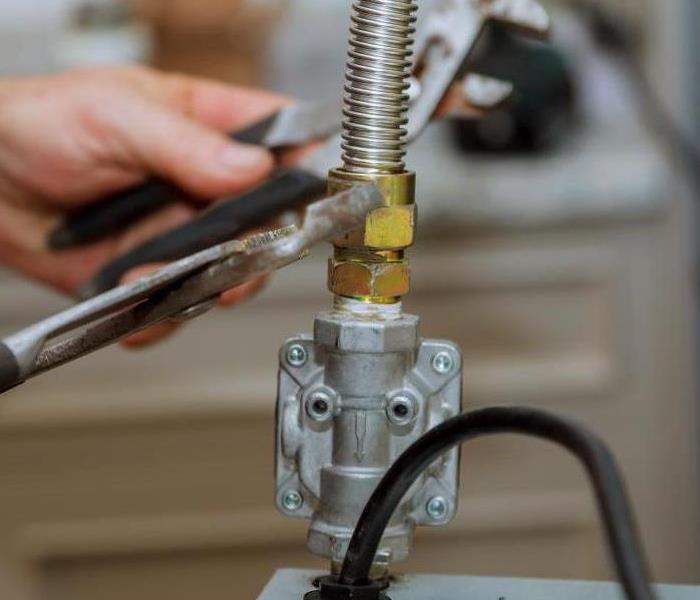 If you notice a noise with your refrigerator, don't ignore the signs.
If you notice a noise with your refrigerator, don't ignore the signs.
A leaking refrigerator can be a major headache, leading to a variety of problems such as water damage to your home, the growth of mold and mildew, and the loss of perishable food items. Here are some signs that your refrigerator may be leaking:
Puddles of Water on the Floor
If you notice puddles of water on the floor near your refrigerator, it's a sure sign that your refrigerator is leaking. This water can be caused by a variety of issues, such as a clogged defrost drain, a faulty water supply line, or a malfunctioning ice maker.
Wet or Damp Refrigerator Shelves
Another sign of a leaking refrigerator is wet or damp refrigerator shelves. This can be caused by water dripping from the ceiling of the refrigerator compartment, which can be due to a clogged defrost drain or a malfunctioning defrost timer.
Frost Buildup in the Freezer
If you notice frost buildup in your freezer, it's a sign that your refrigerator is not properly sealing, which can cause warm air to enter the freezer and create frost buildup. This can be caused by a variety of issues, such as a faulty door gasket, a malfunctioning defrost timer, or a blocked air vent.
Unusual Noises Coming from the Refrigerator
If your refrigerator is making unusual noises, it could be a sign of a leaking refrigerator. This can be caused by a malfunctioning compressor, a faulty fan, or a clogged defrost drain.
Higher Than Normal Energy Bills
If you notice that your energy bills are higher than normal, it could be a sign of a leaking refrigerator. This can be caused by a variety of issues, such as a faulty compressor, a malfunctioning thermostat, or a clogged condenser coil.
Foul Odor Coming from the Refrigerator
If you notice a foul odor coming from your refrigerator, it could be a sign of a leaking refrigerator. This can be caused by a variety of issues, such as the growth of mold and mildew due to excess moisture, or the buildup of food debris in the refrigerator or freezer compartments.
If you notice any of these signs, it's important to take action to address the issue as soon as possible. Contact a professional appliance repair technician to diagnose and repair the issue before it becomes a more serious problem. By addressing a leaking refrigerator early on, you can prevent water damage to your home, protect your perishable food items, and avoid costly repairs in the future.
Choose A Certified Restoration Company
11/3/2022 (Permalink)
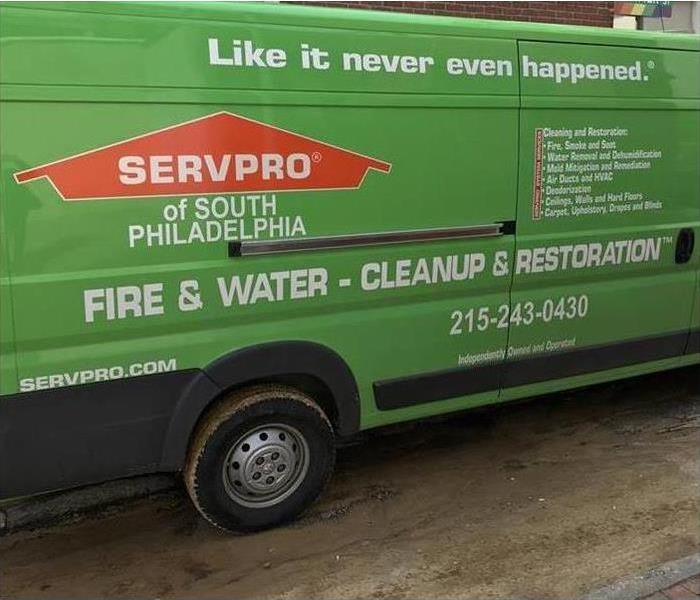 SERVPRO of South Philadelphia is a certified restoration company.
SERVPRO of South Philadelphia is a certified restoration company.
Choose A Certified Restoration Company
If you've ever experienced major water damage in your Philadelphia, PA home, you know how overwhelming the situation can be. There's no need to suffer through this alone: certified professionals can help you get your home back to normal, and prevent further damage from occurring.
Water restoration companies are specially trained in drying out homes after a flood or other water-related incident. They know how to quickly remove excess water and clean up any messes that have been left behind. You should also consider hiring certified professionals if your insurance company requires it (and they usually do).
Water Mitigation is a Big Job
Water damage can be caused by a variety of reasons, and it can become a major problem if not addressed quickly. Water damage can cause mold and other problems that are expensive to fix. You don't want to end up paying for the cost of repairing or replacing your home or business after it has been damaged by water.
Avoiding Secondary Damage
Mold is a major problem for homeowners. If you don’t clean up water damage quickly enough then mold could grow. In fact, some species of mold can grow in 24 hours!
For example, mold likes to eat away at wood and metal surfaces like drywall and cabinets. If left untreated for long enough then this may lead to holes appearing in these materials which will need replacing before they fall apart completely (which would be bad news).
Certified Companies Can Remove Water Quickly
Certified water damage restoration companies will know how to quickly remove excess water. This is important because it helps prevent mold from growing and also keeps your home from getting damaged by the water. Certified companies will also know how to keep your house comfortable while it is being restored.
One of the most important things to consider when it comes to water damage is that you need to dry out the home before repairs can be made. This is because if a basement or any other part of your house has experienced flooding, there's likely mold growing in those areas.
When it comes to drying out a basement, for example, you can use fans and dehumidifiers—which will keep moisture from entering back into the structure—to help prevent mold growth in your home. However, if you don't properly maintain these devices after they've been used (for instance: failing to monitor them regularly), then there's still a chance that new mildew could grow on your property over time.
A certified water restoration company will make sure all of these issues are taken care of so that no further damage happens within your home after their services are completed!
Keeping You Comfortable
You don't want to be miserable while your house is being restored. When you hire a certified water restoration company, they will set up an area in your home where they can do their work without disturbing you or the rest of your family members. You'll get a dedicated team that works together smoothly and efficiently, which means that they will be able to restore your home quickly.
So, if you've had a flood in your home or office, the first thing to do is call a professional water damage restoration service like SERVPRO of South Philadelphia. We will be able to assess the damage and get started on cleaning up any excess water that may have entered your property. It's important not only because it gets rid of potential mold growth but also because it prevents other types of damage like wood rot or drywall damage
How To Unclog a Drain Without Using Harmful Chemicals
7/18/2022 (Permalink)
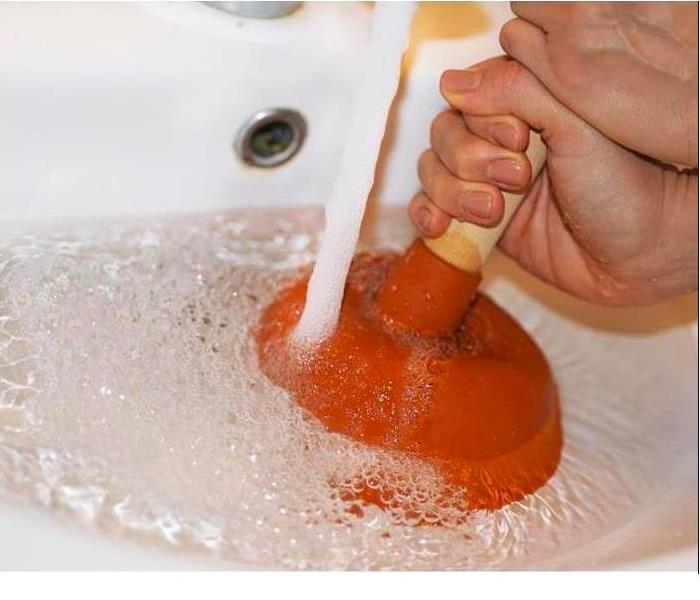 You can try with a plunger to unclog the drain
You can try with a plunger to unclog the drain
Different Ways To Unclog Your Drain
Chemical cleaners may work on your clogged drain, but they can also damage your pipes. The chemicals produce heat which can cause metal and plastic pipes to warp. Using chemicals on drains that are completely blocked is especially bad since they will just sit on top of the blockage causing more damage to your Collingdale, PA pipes. There are some safe and effective alternatives to unclogging your drains, however.
1. Plunger
A sink plunger should be placed over the drain opening so that it seals the area completely. The vacuum created by the pumping action can sometimes clear the clog.
2. Wire Hanger
If a plunger doesn't work, try using a straightened wire hanger. Push the wire down into the drain and then slowly push it out and then back in several times to break up the blockage.
3. Drain Snake
You can rent a drain snake from your local hardware store in, to fix the clogged drain. Place the auger end into the drain and turn it while feeding the cable into the opening. Continue to twist the snake handle until you reach the blockage, allowing the cable to latch onto the clog. Slowly pull out the cable, along with the clog.
4. Baking Soda and White Vinegar
A great alternative to a chemical drain cleaner is using baking soda and white vinegar. The combination of the two ingredients causes a chemical reaction that eats through the blockage, without damaging the pipes. First, pour 3/4 cup baking soda into the drain, followed immediately by 1/2 cup white vinegar. Cover the opening with a rag and leave it for about 30 minutes. Boil some water and pour it down the drain slowly.
It's important to remember that if you require any sewage cleaning, call a water damage repair service as soon as possible.
You don't need harsh chemicals to fix your clogged drain if you try these quick and inexpensive solutions.
Getting Ready for the Insurance Adjuster
4/12/2022 (Permalink)
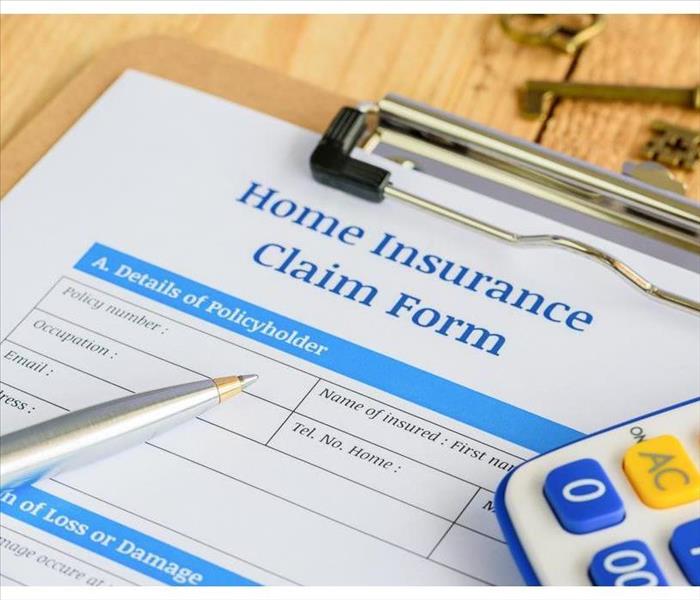 Because water damage occurs unexpectedly, it's a good idea to be prepared ahead of time so you aren't hit with a big bill if the worst happens.
Because water damage occurs unexpectedly, it's a good idea to be prepared ahead of time so you aren't hit with a big bill if the worst happens.
Preparing For The Insurance Adjuster
When your home in Collingdale, PA, has sustained water damage, it can be overwhelming to process what happened and know what to do next. However, as soon as you have a handle on the extent of the damage, it's important to place a claim with your insurance company as quickly as possible. Soon after you file your claim, a home adjuster should be sent out to assess the damage and file a report.
While you're waiting for the adjuster's visit, here are a few tips to help the claims process go smoothly:
Know What To Ask Your Agent
Have your questions written down before calling your insurance company and be sure to ask:
- When to expect the visit from the adjuster
- What receipts you need to provide
- What the deadline is for filing
- What your deductible is
- Whether your policy covers the damage you incurred
- How long it will take to process your insurance claim
Itemize the Damage Thoroughly
Create your own "damage report." In addition to writing out a detailed list, photograph and videotape the overall damage and the damage to each item on your list. If you've saved receipts, collect them and make copies to give to the home adjuster, or if you don't have them, research the current replacement costs for what's been damaged. Get written estimates for repairs and include that along with everything else.
Act Quickly To Repair Damages
If your repairs require expertise not in your skillset, call in the appropriate contractors to begin the work as soon as possible. In many cases, your best option is to hire a water damage remediation service to address everything from the initial cleanup to preventing further damage in the future. Even better, these professionals can work with your insurance company to help speed along the claims process.
If you don't already have it, ask your home adjuster or agent whether you can add a flood insurance rider to your policy. Because water damage occurs unexpectedly, it's a good idea to be prepared ahead of time so you aren't hit with a big bill if the worst happens.
What Will Your Homeowners Insurance Cover When a Pipe Breaks?
2/7/2022 (Permalink)
 If a pipe breaks in your home, your insurance will likely cover most of the damage caused by a resulting flood, but not everything.
If a pipe breaks in your home, your insurance will likely cover most of the damage caused by a resulting flood, but not everything.
When A Pipe Bursts, What Will Your Homeowner's Insurance Cover?
Sometimes, it can be difficult to tell what will be covered under your homeowners insurance and what won’t. If a pipe breaks in your Collingdale, PA home, your insurance will likely cover most of the damage caused by a resulting flood, but there are some things that you may still be responsible for.
What Does the Insurance Company Consider?
When determining whether or not they will cover the damage caused by a broken pipe, there are a few things that your insurance company will consider first.
• Was the break easily preventable?
• Was the incident sudden and accidental?
• Was it the result of negligence?
If it is determined that the pipe was broken as a result of something that was your fault, you may be denied coverage for the damage even if it causes a flood. However, if it was something that you could not have done anything about, then any damage should be covered under your insurance.
What Will Your Homeowners Insurance Cover?
If it is determined that the break is not your fault, then the insurance company should cover the damage. This can include replacing affected property as well as any needed water damage repairs. Depending on the extent of the damage, this might include replacing walls, flooring, or furniture.
What Will You Need to Do?
While the insurance coverage will apply to any damage done to your property, you will more than likely be responsible for replacing the damaged pipe. Unless the pipe burst due to something other than normal wear and tear, your insurance will not cover it and you will need to fix the broken pipe yourself.
Broken pipes can cause your home to flood, so you should do whatever you can to prevent it. If you don’t and your insurance company determines that you are at fault, it can end up being quite expensive to repair. However, if you keep up with proper maintenance of your home, then any accidents should be covered.
A Running Shower and an Overflowing Toilet Indicate a Severe Sewer Blockage
1/4/2022 (Permalink)
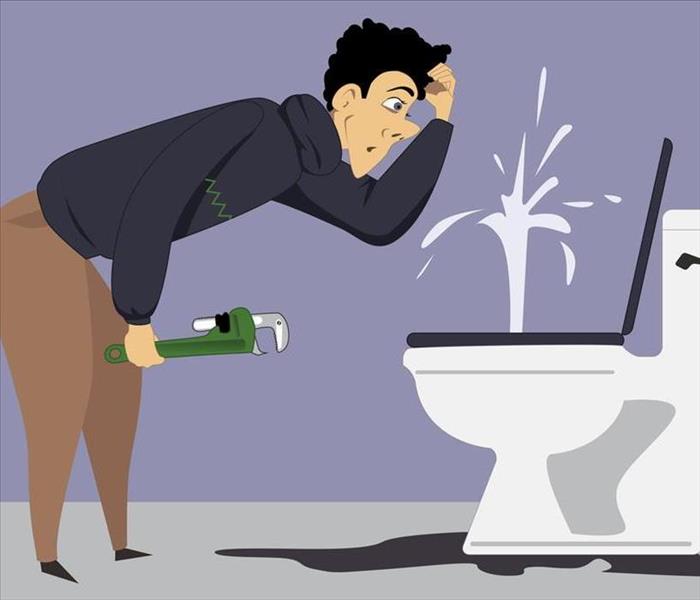 If your toilet overflow caused a significant flood, remember to call SERVPRO, we can help you with any flood or water damage in your home.
If your toilet overflow caused a significant flood, remember to call SERVPRO, we can help you with any flood or water damage in your home.
A Severe Sewer Blockage Is Indicated By A Running Shower And An Overflowing Toilet.
You just discovered that your morning shower caused a toilet overflow downstairs. This overflow indicates that you have a severe plumbing problem and have several concerns:
- You face a messy sewage cleaning job.
- The sewer blockage is below the level of the toilet.
- Other drains may be affected.
You May Be Able To Clear the Clogged Pipe Yourself
Before attempting to clear the pipe, it is essential to perform an initial cleanup of the overflowed sewer water. That is the most dangerous category of water and disinfecting the entire area is recommended. Gloves and a mask are also essential.
If the obstruction is in your house, there is an excellent chance that you can clear the clogged pipe yourself. However, a blockage outside your home will likely require the services of a plumber or even your Department of Public Works.
Determine the location of the blockage by checking the other drains in your home. If any pipes are open, the clog is likely in your home. Unfortunately, the tests may cause more water to back up into the toilet and require additional sewage cleaning. You should take this into account while cleaning the overflow area.
The Plumbing Auger Is the Tool Of Choice For Clearing Blocked Drains
An auger is a long thin coiled wire with a flared tip. You insert it into the toilet as far as it goes. If it encounters the blockage, a twisting and back-and-forth motion and running water will remove the clog. If you don’t own and can’t borrow an auger, someone in the plumbing department of a Sharon Hill, PA, hardware store can help you find the right one.
If your toilet overflow caused a significant flood, consider bringing in flood restoration experts with their specialized equipment and expertise to perform your sewage cleaning. When they are finished treating your home, it will be “Like it never even happened”.






 24/7 Emergency Service
24/7 Emergency Service






